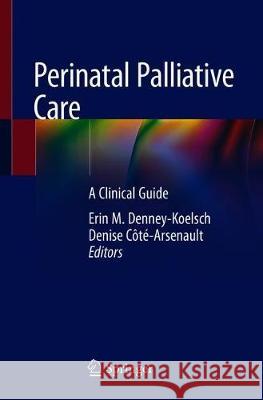Perinatal Palliative Care: A Clinical Guide » książka



Perinatal Palliative Care: A Clinical Guide
ISBN-13: 9783030347505 / Angielski / Miękka / 2020 / 439 str.
Perinatal Palliative Care: A Clinical Guide
ISBN-13: 9783030347505 / Angielski / Miękka / 2020 / 439 str.
(netto: 421,70 VAT: 5%)
Najniższa cena z 30 dni: 424,07
ok. 22 dni roboczych.
Darmowa dostawa!
Introduction
Definition of palliative care in general
Difference between palliative care and hospice
Definition and description of perinatal palliative care
Overview of book and its’ intended uses/audience
Section 1: Parent Experiences with Life-limiting Fetal Diagnoses
1. Theoretical Perspectives a. Prenatal Attachment b. Fetal Personhood c. Bereavement theories d. Developmental Tasks of Pregnancy in Life-limiting Fetal Diagnoses (LLFD) 2. Parental Needs a. Parental decision-making b. Parental needs from health care c. Working with families
Section 2: Clinical Care of Families with LLFD
3. Scope of Care of Interdisciplinary Team (Overview) a. Obstetrics b. Genetics counseling c. Neonatology d. Palliative care e. Nursing care (obstetrics, labor and delivery, neonatal) f. Social work g. Specialists (cardiology, surgery, mental health, etc) 4. Palliative Care Specialist Management a. Family meetings b. Talking about goals of care c. Pain & Symptom management (role of palliative care, details in chapters 6, 7) d. Concurrent palliative and life-sustaining care 5. Obstetrical Management a. Prenatal care – routine and specialized for LLFD b. Ultrasounds (frequency, goal), testing c. Intrapartum management and special considerations i. Monitoring
ii. C-section vs vaginal delivery
d. Postpartum care – routine and specialized for LLFD 6. Neonatal Pain Management a. Pain perception in neonates b. Pain management approaches i. Nonpharmacologic (including nursing and parent role)ii. Pharmacologic (including opioids)
7. Non-Pain Symptom Management a. Nursing role b. Parental involvement c. Agitation and irritability (nonpharmacological, pharmacologic) d. Increased work of breathing e. Constipation f. Seizures g. Feeding and nutrition 8. Care in the Community a. Home care and hospice b. Community resources (bereavement, support groups, etc.) 9. Spiritual Care in the Perinatal Period (chaplain) a. Spiritual Assessment b. Rituals/Baptism? 10. Ethical Considerations in the Perinatal Period a. Ethics of provider presenting options (termination, continuation, palliative care) b. Borders of viability c. Futility d. Feeding and nutrition e. Limiting life-sustaining treatment 11. Bereavement Care a. What does it consist of b. Where is it provided 12. Considerations in Special Populations a. Underserved and minority populations b. Cultural perspectives on perinatal palliative care c. Complex family structure d. Parents who have struggled to conceive i. Prior lossii. Infertility
iii. LGBT couplese. Multiples
f. Infants at the borders of viability
g. When the mother is the one with the life-limiting illness
Section 3: Perinatal Palliative Care Programs
13. Structure of PPC Programs + Starting a PPC Program
14. Interdisciplinary Care
a. Communication within interdisciplinary care team
b. Birth Planning and Birth Plans
c. Care coordination
d. Self-care of care team
15. Education and Training in PPC
Erin M. Denney-Koelsch, MD, FAAHPM
Associate Professor of Medicine and Pediatrics
University of Rochester Medical Center
Strong Memorial Hospital
Department of Medicine
Division of Palliative Care
Rochester, NY 14642 USA
Denise Côté-Arsenault, PhD, RN, CPLC, FAAN
Hemak Endowed Professor of Maternal Child Nursing
St. Louis University
School of Nursing
St. Louis, MO 63104 USA
This unique book is a first-of-its-kind resource that comprehensively covers each facet and challenge of providing optimal perinatal palliative care. Designed for a wide and multi-disciplinary audience, the subjects covered range from theoretical to the clinical and the practically relevant, and all chapters include case studies that provide real-world scenarios as additional teaching tools for the reader.
Perinatal Palliative Care: A Clinical Guide is divided into four sections. Part One provides the foundation, covering an overview of the field, key theories that guide the practice of perinatal palliative care, and includes a discussion of perinatal ethics and parental experiences and needs upon receiving a life-limiting fetal diagnosis. Part Two delves further into practical clinical care, guiding readers through issues of obstetrical management, genetic counseling, neonatal pain management, non-pain symptom management, spiritual care, and perinatal bereavement care. Part Three discusses models of perinatal palliative care, closely examining evidence for different types of PPC programs: from hospital-based programs, to community-based care, and examines issues of interdisciplinary PPC care coordination, birth planning, and team support. Finally, Part Four concludes the book with a close look at special considerations in the field. In this section, racial, ethnic, and cultural perspectives and implications for PPC are discussed, along with lessons in how to provide PPC for a wide-range of clinical and other healthcare workers. The book closes with a look to the future of the field of perinatal palliative care.
Thorough and practical, Perinatal Palliative Care: A Clinical Guide is an ideal resource for any healthcare practitioner working with these vulnerable patient populations, from palliative care specialists, to obstetricians, midwifes, neonatologists, hospice providers, nurses, doulas, social workers, chaplains, therapists, ethicists, and child life specialists.1997-2026 DolnySlask.com Agencja Internetowa
KrainaKsiazek.PL - Księgarnia Internetowa









